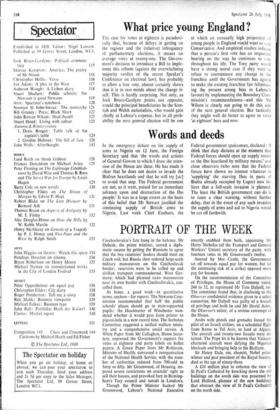What price young England?
The case for votes at eighteen is paradoxi- cally that, because of delays in getting on the register and the (relative) infrequency of parliamentary elections, it means on average votes at twenty-one. The Govern- ment's decision to introduce a Bill to imple- ment this reform (against the overwhelming majority verdict of the recent Speaker's Conference on electoral law), but probably to allow a free vote, almost certainly shows that it is in two minds about the change it- self. This is hardly surprising. Not only, as Jock Bruce-Gardyne points out opposite, would the principal beneficiaries be the Scot- tish and Welsh nationalists, who would gain chiefly at Labour's expense, but in all prob- ability the next general election will be one at which an unusually high proportion of young people in England would want to vote Conservative. And empirical studies indicate that a person's first vote has an important bearing on the way he continues to wte throughout his life. The Tory party would have a strong moral case if they were to refuse to countenance any change in the franchise until the Government has agreed to make the existing franchise fair (eliminat- ing the present strong biai in Labour's favour) by implementing the Boundary Com- mission's recommendations—and this Mr Wilson is clearly not going to do this side of the next general election. But tactically they might well do better to agree to votes 'at eighteen' here and now.






































 Previous page
Previous page